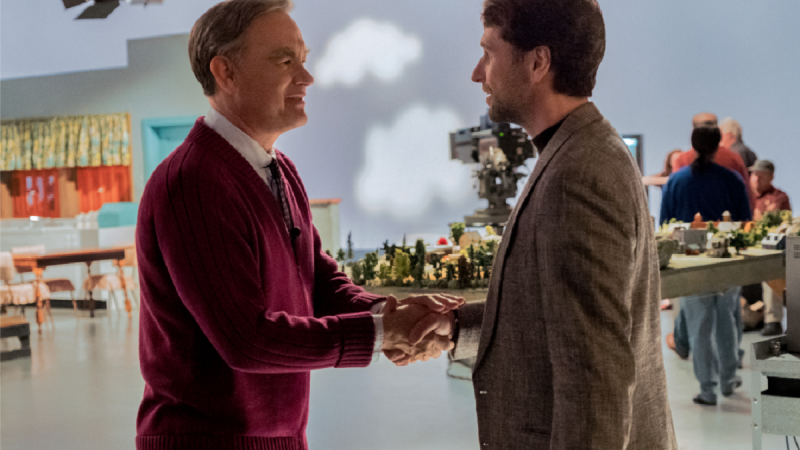Review: A Beautiful Day in the Neighborhood
Some quality time with Tom Hanks’s Mister Rogers.

It's appropriate that A Beautiful Day in the Neighborhood, while ostensibly about the late children's TV host Fred Rogers, is in fact not entirely, or even mostly, about him. The real protagonist of the film is Lloyd Vogel, a sour, stubbly New York writer who's been assigned by Esquire magazine to write a profile of Rogers—Mister Rogers, as he's known to a legion of American preschool kids and the adults who learned to love him as the kids they once were.
Lloyd, who's played by Matthew Rhys, of The Americans, is not happy about this assignment. His specialty is the exposé—heaping contumely on public figures who he feels deserve it. But his editor (Christine Lahti) is demanding a breezy 400 words on Rogers, so Lloyd is hoping there's dirt to dig up on this guy as well. Reluctantly, he sets off for Pittsburgh, the home base of Mister Rogers's PBS show. (The year is 1998; Mister Rogers' Neighborhood began airing nationally in 1968.)
By this point we have already met Mister Rogers, who's played by Tom Hanks in an unimprovable performance of carefully projected naiveté. The movie opens inside Rogers's well-known Neighborhood of Make-Believe. We see the model town, the toy trolley. We watch Rogers enter his TV living room singing "Won't You Be My Neighbor?" and then donning his homey red cardigan and comfy blue sneakers. Today he's going to show us some pictures. One is of a man named Lloyd, he tells his young viewers. "He's having a hard time forgiving the person who hurt him."
So the movie cleverly sets Lloyd up as the latest entry in Mister Rogers's capacious case file. There's an unhealed wound in Lloyd's life: his irresponsible father, Jerry (Chris Cooper), who was out womanizing while Lloyd's mother lay on her deathbed and then didn't even come to her funeral. This ignited an anger in his son that Lloyd can't let go. When Lloyd tells his wife, Andrea (Susan Kelechi Watson), that he's leaving for Pittsburgh to interview Mister Rogers, she unexpectedly responds, "I love him." "You do?" Lloyd says. "Please don't ruin my childhood," Andrea says.
Here we have a movie that's unashamedly heartwarming, and yet captivating as well. (Credit for this must go to director Marielle Heller, a filmmaker of unusual gifts, as she's demonstrated in The Diary of a Teenage Girl and Can You Ever Forgive Me?) Like Fred Rogers himself, the picture is devoted to the navigation of feelings and to the best qualities in all people. But that's deceptive. Rogers was also, among several other things (puppeteer, composer, songwriter, ordained Presbyterian minister), a trained student of child psychology, and he knew that children grapple with some of the same issues adults do—death, sorrow, insecurity—but are less prepared to deal with them. That was where Mister Rogers came in.
We learn a lot about the man very quickly in his first encounter with Lloyd. Taking him out onto the studio floor to meet the crew, Rogers—who's never encountered the grumpy journalist before—says, "This is Lloyd Vogel—he's a wonderful writer." Lloyd watches as Rogers does a bit for the show in which he attempts to erect a camping tent and screws it up miserably. Lloyd wonders what the point of putting this on the air is. "Children need to know that when adults make plans, they can sometimes go wrong," Rogers says. Then there's a song, written by Fred, pertinent to Lloyd, called "What Do You Do with the Mad That You Feel?"
Can Lloyd overcome his fury with his dad? Will he resolve to apply the lessons he's learned from it to his relationship with his own little boy? Yes, and yes. There are no surprises in this movie—there's only the emotional acuity that director Heller brings to her subject. She also allows us to contemplate a little-explored aspect of Mister Rogers – his unsettling strangeness (at least on first exposure). Very early on, out of nowhere, he says to Lloyd, "Would you like to meet my puppet friends from the World of Make-Believe?" Lloyd is a little freaked out by this—he might even be wondering if Fred is the right guy to be working with small children. But like everyone else, Lloyd is soon a believer. (After the two men board a subway car, a group of kids already onboard spontaneously breaks into "Won't You Be My Neighbor?")
Lloyd finally turns in his Mister Rogers profile, which has ballooned from an assigned 400 words to a 4000-word testimonial. This is an echo of the movie's inspiration: Tom Junod's celebrated 1998 Esquire cover story about Rogers, the headline for which—"Can You Say…Hero?"—was, by the time one finished reading the piece, altogether rhetorical.


Show Comments (11)